Are you tired of discovering a pool of water in your truck bed after a heavy rainstorm?
Wondering if tonneau covers truly provide reliable protection against water infiltration?
In this blog post, we’ll explore the effectiveness of tonneau covers in keeping water out, providing you with the information you need to make an informed decision.
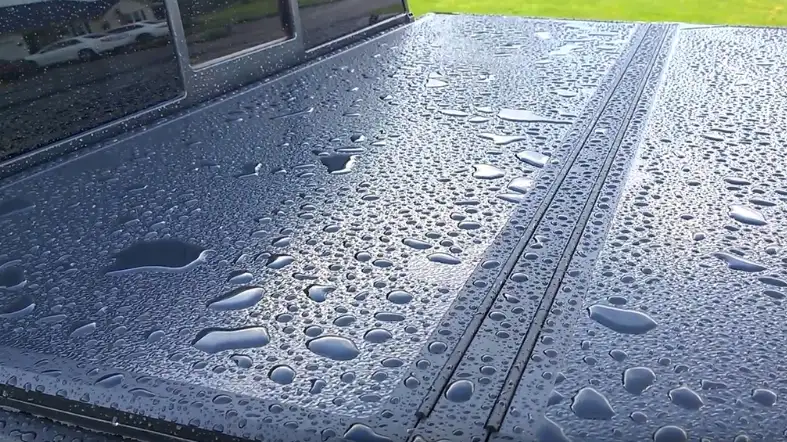
Do Tonneau Covers Keep Water Out?
Yes, tonneau covers are designed to keep water out, providing a protective barrier against rain. However, they are water-resistant, not waterproof, so small amounts of water may still seep in. While they offer protection, complete dryness cannot be guaranteed.
How Tonneau Covers Provide Water Resistance
High-Quality Materials and Construction
One of the primary reasons Tonneau covers are effective at providing water resistance is their construction using high-quality materials.
These covers are typically made from durable materials such as vinyl, aluminum, or fiberglass.
These materials are chosen for their ability to withstand exposure to water and maintain their integrity over time.
The covers are carefully crafted, ensuring a tight fit and minimizing any potential gaps where water could seep through.
This attention to detail in construction is crucial in preventing water from entering the truck bed.
Sealed Edges and Weather Stripping
Tonneau covers incorporate sealed edges and weather stripping to enhance their water resistance capabilities.
These features create a barrier that prevents water from seeping into the truck bed.
The edges of the cover are designed to fit snugly against the sides of the bed, leaving no room for water to penetrate.
Additionally, weather stripping is applied along the perimeter of the cover, further sealing any potential entry points.
The combination of sealed edges and weather stripping ensures that water is effectively kept out, keeping your cargo dry and protected.
Drainage Systems
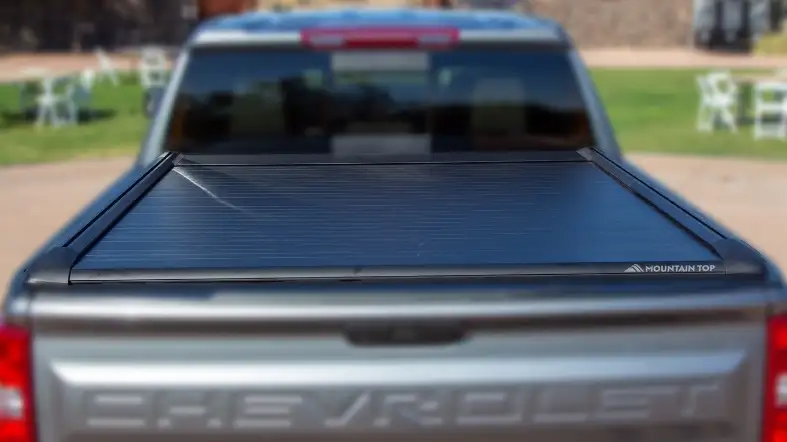
While Tonneau covers excel at keeping water out, they also account for any moisture that may accumulate on the cover itself.
Some covers are equipped with built-in drainage systems to manage water that collects on the surface effectively.
These drainage systems typically feature strategically placed channels or tubes that allow water to flow off the cover and away from the truck bed.
By facilitating proper drainage, these systems prevent water from pooling on the cover and potentially finding its way into the truck bed.
Tri-Fold and Roll-Up Designs
Tonneau covers come in various designs, with tri-fold and roll-up covers being popular options.
These designs offer specific advantages when it comes to water resistance.
Tri-fold covers feature multiple panels that fold onto each other, creating overlapping layers that provide added protection against water infiltration.
Conversely, roll-up covers are made from durable materials that can be tightly secured in place.
When properly fastened, roll-up covers seal the truck bed effectively, minimizing water seepage chances.
Types Of Tonneau Covers And Their Water Resistance Capabilities
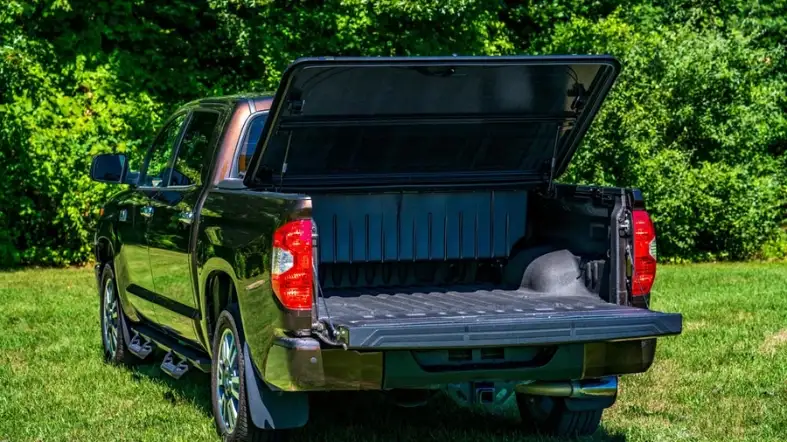
Soft Roll-Up Tonneau Covers
Due to its adaptability and usability, soft roll-up tonneau coverings are popular. Durable vinyl or fabric is stretched over an aluminum frame.
Hook-and-loop or snap systems secure these covers. Soft roll-up tonneau covers are great for dust, debris, and light rain, but they may not be water-resistant.
Some soft roll-up tonneau coverings have water-resistant characteristics. Built-in drain tubes and sealed seams prevent water leaks from the truck bed.
However, water may still enter the bed during heavy rain or car washes.
Hard Folding Tonneau Covers
Durable hard folding tonneau coverings are secure. Aluminum or fiberglass panels form these lids.
They fold up in parts for ease of truck bed access. Closed, the panels form a watertight seal.
Hard folding tonneau coverings resist water well. Panels overlap to keep water out.
Hard folding covers with drain channels and weather seals further reduce water infiltration.
Truck owners looking for the greatest water resistance may consider hard folding tonneau coverings.
Retractable Tonneau Covers
Retractable tonneau covers are stylish and convenient. They usually have a roll-top or slatted design that can be opened or closed.
Retractable coverings might be aluminum, polycarbonate, or vinyl.
Retractable tonneau coverings are water-resistant. Weather sealing, drainage, and cover construction keep water out.
Water resistance varies by brand and model. To ensure water protection, read product specifications and reviews.
One-Piece Solid Tonneau Covers
One-piece solid tonneau coverings are sturdy and stylish. These hinged fiberglass or ABS plastic coverings offer convenient truck bed access. They are water-resistant and secure.
One-piece solid tonneau coverings prevent water intrusion. Weatherstripping and rubber sealing along the edges improve water resistance.
Even in severe rain or car washes, this tonneau cover repels water.
Factors To Consider When Selecting A Tonneau Cover For Water Protection
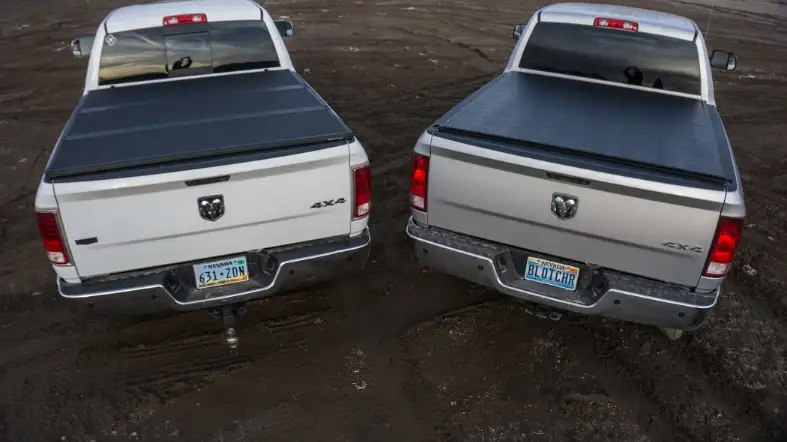
Material
The type of material used in the tonneau cover plays a vital role in its water resistance capabilities.
Look for covers made from durable, waterproof materials such as vinyl, fiberglass, or aluminum.
These materials offer excellent protection against water infiltration and are resistant to warping or cracking due to exposure to moisture.
Ensure that the cover material has a sealed construction to prevent any potential water leaks.
Design and Construction
Consider the design and construction of the tonneau cover to ensure optimal water protection.
Look for covers with a low-profile design that sits flush with your truck bed, reducing the chances of water pooling or seeping through gaps.
A cover with overlapping edges or built-in drainage systems can effectively divert water away from the truck bed, minimizing the risk of water damage to your cargo.
Sealing Mechanism
Check for a reliable sealing mechanism on the tonneau cover to prevent water from entering the truck bed.
Some cover feature rubber seals or weather stripping along the edges, creating a watertight seal when closed.
This ensures that your cargo remains dry and protected even during heavy rainfall or while driving through water.
Inspect the quality and condition of the seals regularly to ensure they maintain their water-resistant properties over time.
Installation Process
Consider the installation process of the tonneau covers to ensure a secure fit that minimizes water penetration.
Look for covers that offer a tight and precise fit onto your truck bed, leaving minimal gaps for water to seep through.
Some covers may require professional installation to ensure proper alignment and a watertight seal.
Follow the manufacturer’s instructions carefully or consult a professional to ensure a correct and effective installation.
Compatibility with Bed Accessories
If you have additional bed accessories like ladder racks, toolboxes, or bed liners, ensure that the tonneau covers you choose are compatible.
Some covers may require modifications or be incompatible with certain accessories, compromising the overall water protection.
Consider covers that can accommodate your existing accessories without compromising the integrity of the water seal.
Warranty and Customer Support
Lastly, consider the warranty and customer support provided by the manufacturer.
A reputable company will stand behind its product and offer a warranty that covers defects or malfunctions, including water leaks.
Additionally, accessible customer support can assist you in addressing any concerns or questions you may have regarding the tonneau cover’s water protection features.
Proper Installation Techniques For Optimal Water Resistance
Choose the Right Tonneau Cover
Start with a water-resistant tonneau cover. Choose vinyl or heavy-duty cloth covers. Covers with weather seals or drain tubes prevent water from entering the truck bed.
Clean and Prepare the Truck Bed
The truck bed must be cleaned and prepared before installing the tonneau cover.
Remove any debris, dirt, or residue that could affect cover installation or water resistance.
Wash the bed with mild detergent and water and let it dry before continuing.
Test Fit Tonneau Cover
Place the tonneau cover on the truck bed carefully without securing it. Test fit the cover and make sure it aligns with the bed rails.
Adjust the cover to fit the truck bed borders evenly and snugly.
Secure Mounting Hardware
After fitting, apply the tonneau cover’s mounting hardware. Tighten hardware according to the manufacturer’s directions.
To prevent water from entering the truck bed, attach the hardware securely.
Check Gaps and Seams
After installing the mounting hardware, check the tonneau cover for leaks.
Check the cover’s edges, corners, and seams. Adjust the cover or mounting hardware to close any gaps or loose spots.
Apply a Weather Seal
Weather protects the tonneau cover edges for further water resistance. Weather seals protect the cover from the truck bed with adhesive strips or foam adhesives.
Make sure the weather seal seals tightly when the cover is closed by following the manufacturer’s directions.
Water Resistance Test
Test the tonneau cover’s water resistance after installation. Simulate rain with a hose or bucket and watch for water in the truck bed.
Check edges, corners, and weak places. Fix leaks by tightening mounting hardware or adding weather seals.
Maintenance Tips To Ensure Long-Lasting Water Resistance
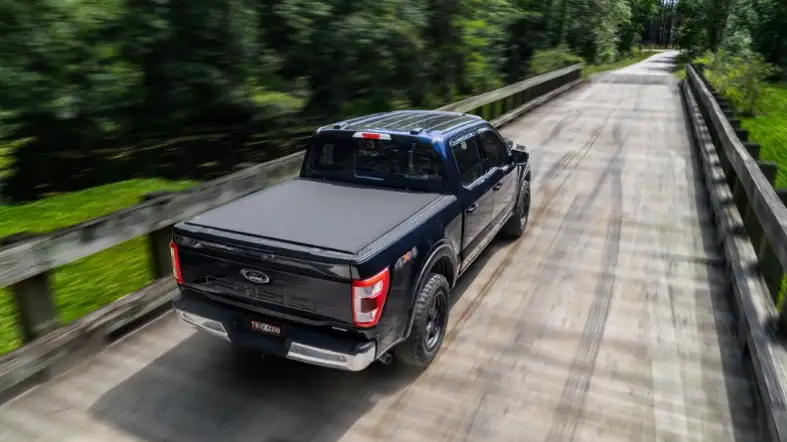
Inspect and Clean Regularly
Start by inspecting and cleaning water-resistant objects periodically. Find tears, cracks, and loose seams. To prevent water seepage, fix any concerns immediately.
Clean water-resistant goods regularly using the right tools. Avoid harming waterproofing by following manufacturer recommendations.
Avoid Extreme Temperatures
Avoid Extreme Temperatures: Extreme temperatures affect water resistance. Extreme heat or cold can cause materials to expand or contract, weakening waterproofing.
For instance, prolonged exposure to direct sunlight can destroy water-resistant polymers, reducing their efficacy.
Check Seals and Gaskets
Water resistance depends on seals and gaskets. Check these parts for wear and tear. Replace damaged items immediately.
Rotten seals and gaskets can let water through, undermining their purpose.
Avoid Harsh Chemicals
Avoid Harsh Chemicals: Be careful when cleaning water-resistant products.
Bleach and solvents deteriorate waterproofing and damage materials. Instead, use gentle, non-abrasive cleansers made for your item. Check the manufacturer’s instructions.
Reseal or Reapply Waterproofing
Apply again. Waterproofing: Items lose their waterproofing with time. Reseal or reapply to waterproof if water is no longer repelling.
Outdoor gear like tents and backpacks may need occasional repair to maintain water resistance. Consult the manufacturer’s instructions or an expert.
Handle with Care
Handle Carefully: To preserve your water-resistant products, handle them carefully. Rough handling might cause tears or abrasions that reduce water resistance.
Sharp things can harm the material. Treating water-resistant things gently helps them last longer.
Store Properly
Proper storage preserves water resistance. Before storing, clean and dry them.
Mold and mildew can degrade materials and reduce water resistance if stored with moisture. Keep water-resistant products cool, dry, and out of direct sunlight.
Additional Accessories To Enhance Water Protection
Tailgate Seal
A tailgate seal is necessary to seal your tonneau cover and tailgate. This rubber seal prevents water from entering your truck’s bed. It shields goods from rain, snow, and grime.
Cleaning the tailgate and applying the seal with automotive-grade adhesive is all it takes to install a tailgate seal.
Bulkhead Seal
Another tonneau cover addition that improves water protection is the bulkhead seal.
This seal seals the gap between the front of your truck bed and the bulkhead or cab. Closing this area inhibits front-entry water.
Depending on the model, weather-resistant rubber bulkhead seals can be simply installed using adhesive or snap-on techniques.
Bed Caps
Bed caps protect your truck bed’s top edges from water. They’re especially beneficial if your tonneau cover doesn’t cover the bed’s edges.
Bed caps are constructed of strong materials like aluminum or high-density polyethylene and come in several shapes and finishes to fit your truck. Bed caps have pre-drilled holes for easy installation.
Drain Tubes
Drain tubes keep water off your tonneau cover. The tonneau cover’s lowest tubes drain water, keeping it dry and minimizing drooping.
Rubber or PVC drain tubes can be routed via truck bed holes or channels. Drain tubes must be cleaned regularly to work properly.
Tonneau Cover Cleaner and Protectant
Along with the accessories above, maintaining your tonneau cover is essential for water protection and longevity. Use a tonneau cover cleanser and protectant to achieve this.
These products clean and protect your cover from water and UV rays.
To keep your tonneau cover water-resistant, clean and apply protectant according to the manufacturer’s instructions.
Real-Life Testimonials: Experiences Of Truck Owners With Tonneau Covers In Rainy Conditions
John’s Experience with a Soft Roll-Up Cover
An avid truck owner, John opted for a soft roll-up tonneau cover. During a heavy rainstorm, he was pleasantly surprised to find his truck bed completely dry.
The cover’s tight seals and integrated drainage system prevented water from entering the bed.
John also appreciated the ease of installation and how quickly he could roll up the cover when needed.
Sarah’s Encounter with a Hard Folding Cover
Another truck owner Sarah chose a hard folding tonneau cover for her vehicle. She encountered a persistent rain shower while transporting valuable cargo.
To her relief, the cover’s durable construction and weather seals provided excellent protection against water intrusion.
Sarah also found the folding mechanism user-friendly, allowing her to access the truck bed easily when needed.
Mike’s Insights on a Retractable Cover
Mike, a truck enthusiast, invested in a retractable tonneau cover. Despite heavy rainfall, he discovered that his truck bed remained dry throughout the journey.
The cover’s sturdy build, reinforced seals, and innovative water diversion system impressed him.
Mike also appreciated the cover’s sleek appearance and the convenience of retracting it partially or fully depending on his cargo needs.
Will Washing My Truck with a Tonneau Cover Damage the Cover or Allow Water to Get Inside?
When it comes to washing truck with tonneau cover, you might be concerned about potential damage or water seepage. However, most tonneau covers are designed to withstand regular car washes. To be on the safe side, follow the manufacturer’s guidelines and avoid using high-pressure washing techniques. Taking proper care will ensure your cover remains intact and prevents water from entering your truck bed.
FAQs
How Effective Are Tonneau Covers At Keeping Water Out?
Tonneau covers are generally effective at keeping water out of your truck bed, but the level of effectiveness can vary depending on the type and quality of the cover you choose.
Do All Tonneau Covers Offer The Same Level Of Water Resistance?
No, not all tonneau covers offer the same level of water resistance.
Hard folding or roll-up covers with integrated seals tend to provide better water protection compared to soft covers or snap-on variants.
Can I Leave My Truck Bed Exposed To Rain If I Have A Tonneau Cover?
In general, tonneau covers are designed to withstand rain and protect your truck bed.
However, it’s recommended to close the cover to ensure optimal water resistance and to prevent any potential damage to the cover itself.
How Can I Improve The Water-Resistance Of My Tonneau Cover?
To enhance the water resistance of your tonneau cover, you can ensure proper installation and regularly check for any damage or wear that might compromise the seal.
Additionally, using additional weather seals or tailgate seals can further reduce the chance of water infiltration.
What Should I Do If Water Enters My Truck Bed Despite Having A Tonneau Cover?
If water enters your truck bed despite having a tonneau cover, it’s advisable to inspect the cover for any damage or misalignment.
Adjustments, repairs, or replacements may be necessary to restore the water resistance of the cover and prevent further issues.
Final Words
Keep your truck bed dry and protected with tonneau covers. These covers are designed to keep water out, providing a watertight seal when properly installed.
With various types available, such as hard folding or roll-up covers, you can choose one that offers better water resistance.
Regular maintenance and additional seals can further enhance the cover’s performance, ensuring a dry and secure truck bed, even in rainy conditions.
